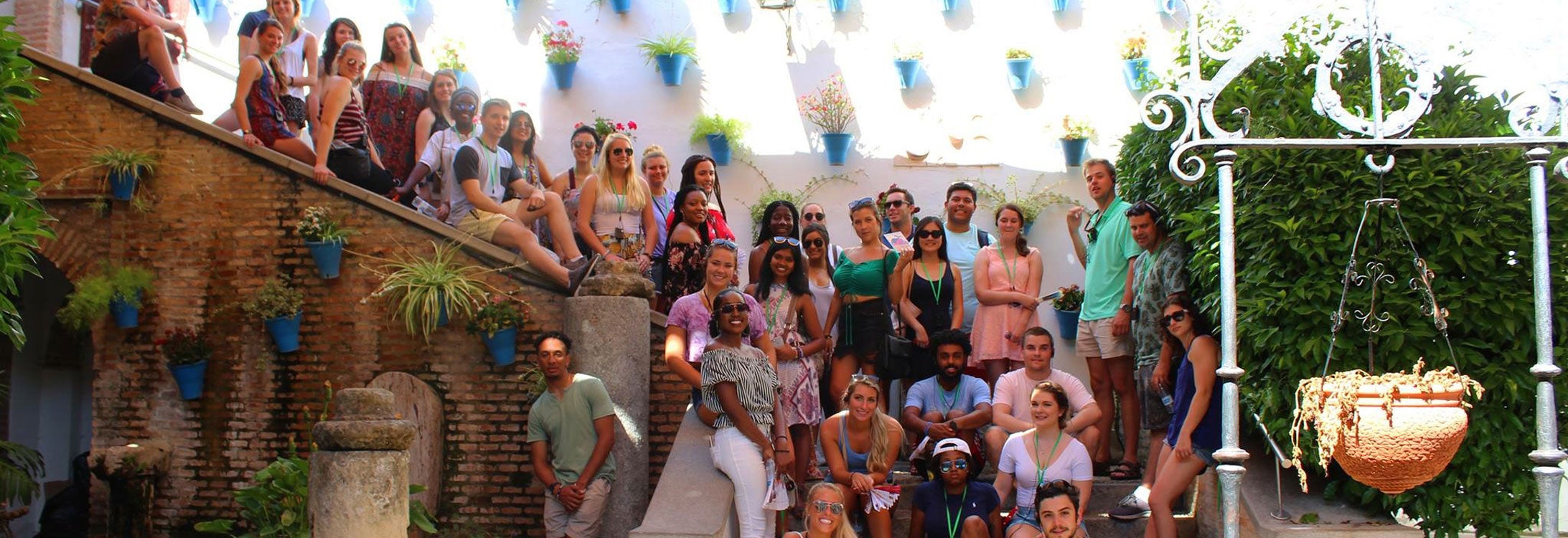Departmental History
On this Page
Departmental Structure & Leadership
It was not until 1923, two years after East Carolina Teacher Training School became East Carolina Teachers College, that a formal Department of Foreign Languages was established under the leadership of R.C. Deal.
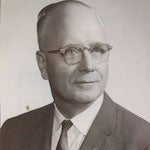 Upon the retirement of Prof. Deal in 1945, James L. Fleming (left) was named chair. (Professor Fleming was the son of James L. Fleming, the state senator from Pitt County who sponsored the bill in the General Assembly that created ECTTS.) The departmental faculty comprised Mr. Fleming and Miss Marguerite Austin, later Mrs. Marguerite Austin Perry. In the early years, there was relatively little interest on campus in the study of foreign languages. The influx of ex-servicemen to the campus in the years following World War II helped to change the attitude toward the study of foreign languages.
Upon the retirement of Prof. Deal in 1945, James L. Fleming (left) was named chair. (Professor Fleming was the son of James L. Fleming, the state senator from Pitt County who sponsored the bill in the General Assembly that created ECTTS.) The departmental faculty comprised Mr. Fleming and Miss Marguerite Austin, later Mrs. Marguerite Austin Perry. In the early years, there was relatively little interest on campus in the study of foreign languages. The influx of ex-servicemen to the campus in the years following World War II helped to change the attitude toward the study of foreign languages.
During the 1950’s the department expanded as courses in German and Russian were added to those in French and Spanish. Joining Professor Perry were Elizabeth L. Mims, Robert R. Morrison, Erich Franz Graf, Gertrud R. Graf, James Roy Prince, and Henry Wanderman.
Professor Fleming conducted various experiments in foreign language pedagogy. From 1956 to 1963 he taught classes in French for elementary school children. He introduced an intensive language course that made it possible for students to complete a year’s work in six weeks of summer school. Veterans coming to college under the GI Bill first took this intensive course. The campus newspaper described it as a wonderful adventure “with strait jackets required as standard equipment,” so demanding was the five-hour class period.
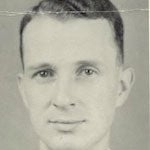 The sixties were a period of increased enrollment. The launching of Sputnik in the fifties and investment of federal funds in intensive training for language teachers had heightened interest in learning languages throughout the United States. Two units of high school foreign language study were required for admission to ECU. This was quite a change from the period 1929 to 1949 when the catalog explicitly stated that ”a foreign language is not required for admission unless the student chooses foreign languages as one of her majors.” Still more foreign language courses were required for graduation. By 1966 all candidates for the BA degree had to complete two literature or civilization courses beyond the intermediate level. A number of BS programs as well insisted on 20 quarter hours of a foreign language. In 1965, 1967, and 1968, the department hosted National Defense Education Act (NDEA) Summer Institutes for Spanish, the first two directed by Robert Morrison (right), the third by Norma Richardson. In 1969 there was an Education Professions Development Act (EPDA) Spanish Summer Institute, directed by Gary Ambert.
The sixties were a period of increased enrollment. The launching of Sputnik in the fifties and investment of federal funds in intensive training for language teachers had heightened interest in learning languages throughout the United States. Two units of high school foreign language study were required for admission to ECU. This was quite a change from the period 1929 to 1949 when the catalog explicitly stated that ”a foreign language is not required for admission unless the student chooses foreign languages as one of her majors.” Still more foreign language courses were required for graduation. By 1966 all candidates for the BA degree had to complete two literature or civilization courses beyond the intermediate level. A number of BS programs as well insisted on 20 quarter hours of a foreign language. In 1965, 1967, and 1968, the department hosted National Defense Education Act (NDEA) Summer Institutes for Spanish, the first two directed by Robert Morrison (right), the third by Norma Richardson. In 1969 there was an Education Professions Development Act (EPDA) Spanish Summer Institute, directed by Gary Ambert.
Department of Romance Languages and Department of German and Russian (1966-1974):
In 1966 Mr. Fleming recommended that the department of Foreign Languages be split into three departments of French, Spanish and German. The final reorganization left Mr. Fleming as chair of Foreign Languages, while creating separate departments of Romance Languages, under Joseph Fernandez, and German and Russian, under Henry Wanderman. Romance Languages were housed in Graham Building, while Russian/German was in Lawrence F. Brewster Building. By 1969 there were 29 Romance Language faculty members and nine German/Russian faculty members. Professor Fleming retired in 1970. Dr. Fernandez continued as chair of the Department of Romance Languages until 1973. Marguerite Austin Perry became acting chair shortly thereafter.
Department of Foreign Languages and Literatures (1974-Present):
When Henry Wanderman retired in 1974, the two departments were rejoined under Professor Perry’s leadership into the Department of Foreign Languages and Literatures. One of the big annual events of this period was Foreign Language Day, which brought hundreds of students to Christianbury Gym for competitions, performances, and myriad cultural booths. The 1970’s were also a good period for foreign languages, perhaps the best ever. Classes were full and many students continued their foreign language study at important graduate schools across the country. But in the late 1970’s the graduate programs in French and Spanish at ECU began to diminish in size.
Dr. Martin Schwarz came to ECU from the University of Tulsa to chair the Department of Foreign Languages and Literatures in 1981. During Dr. Schwarz’s tenure as chair, efforts were made to reinstate the graduate programs. Italian was offered for the first time. Chinese was offered through an agreement with NC State (1983-4). The Governor’s Language Institutes were held on campus, in Spanish under the guidance of Manolita Buck, and in French under Dr. Schwarz and Dr. Michael Bassman. In 1986 Dr. Stephen V. Dock and Dr. Karine Sparrow-Ginter inaugurated the ECU-Sorbonne Summer Program, which they directed from 1987 to 1990. Having already successfully begun the program in Medieval/Renaissance Studies in 1974, Dr. Bassman started an interdisciplinary Ethnic Studies program in 1989.
Throughout this period, International Language Organization, representing all the major languages of the department, sponsored a variety of cultural and linguistic activities that brought together faculty and students. In the late l980’s, separate French and Spanish clubs were set up. Each club even had it own newsletter written by students: “Placotons” under the direction of Dr. Frédéric Fladenmuller and “La Canción del pirata,” under the direction of Dr. Judith Hepler-Arias. The language clubs have recently rejoined to once again form an International Language Organization (2001).
Dr. Fladenmuller has been an active organizer of programs since the late 1980’s. In 1989, he organized the “Bicentennial Symposium: The French Revolution and Its Legacy” that included a production of Georg Buchner’s Danton’s Death by the East Carolina Playhouse and a concert by the School of Music and, in 1992, “Europe ’92: International Conference on the European Community.”
Dr. Schwarz stepped down in 1989. While an international search was conducted for a new chair, Dr. Rosina Chia of the Department of Psychology led the department.
Dr. Peter Standish, Professor of Spanish, joined the department as its new chair in 1991, having previously been associated with universities in England and Scotland. He remained chair until 1995. Dr. Standish strove to raise the department’s research profile and professional standing as the university moved toward Doctoral II status. He was particularly concerned to find ways to encourage faculty to pursue their scholarship more vigorously.
Under his leadership accelerated summer courses in French and Spanish were established, and much effort was expended in an attempt to gain approval of MA programs in French and Spanish. Although the MA programs in French and Spanish did not receive approval, Dr. Standish oversaw the expansion of the program in Classics and much recruiting of new faculty in Spanish and French. More courses in “literature in translation” were also added to the curriculum. Under a special arrangement with the Exchange Japan Program, two years of Japanese language was taught by a specially trained graduate student from Japan. The Department of Foreign Languages and Literatures also began sharing the directorship of a study abroad program in Santander (Spain) through a consortium headed by UNC-Charlotte. It also became associated with the Masters in International Studies (MAIS), which has a significant foreign language requirement.
The summer of 1992 was particularly active. The Governor’s Language Institute (French) was held on the ECU campus under the directorship of Dr. Martin Schwarz and Dr. Frédéric Fladenmuller. Dr. Schwarz also accompanied a group of students to Paris on the ECU Sorbonne Summer Program. Professors Raquel Manning and Lucinda Wright took a group of students to Costa Rica on the ECU Spanish Language and Cultural Program at the Universidad Nacional.
From 1995 to 1997, the department was lead by interim chair, Dr. Charles Sullivan III (of the Department of English) as the foreign language department conducted a national search for a new chair. During this period the Multidisciplinary Major was established and headed by Dr. Steven Cerutti of Classics. The French Program also held an annual French Day celebration that brought area middle and high school students to campus for language and culture competitions.
Dr. Sylvie Debevec Henning, Professor of French, joined the department as its new chair in 1997, after having served as chair for many years in the State University of New York. Since her arrival, revised Spanish, French and German curricula have been put into place, contacts with the professional schools have been established or strengthened, and outreach activities have been undertaken. The Modified Spanish Program for At-Risk Students began its first 1001-1004 sequence in Fall 2000.
The Department of Foreign Languages and Literatures hosted the Whichard Chair in the Humanities for two years. The appointees were Dr. Roger Hornsby, 1997-1998; Dr. Charles Fantazzi, 1998-1999, both in Classics. The department has been fortunate to be able to retain Dr. Fantazzi, first as a Distinguished Visiting Professor of Humanities (1999-2000) and then as the Thomas Hariot Distinguished Visiting Professor of Classics and the Great Books (2000-2001). As part of his teaching responsibilities, Dr. Fantazzi has reintroduced Italian.
Changing enrollment trends nationwide and throughout the state of NC during the 1990’s have had mixed effects of the department. The enrollment in Spanish has increased dramatically while the enrollments in French, German and Russian have declined. A statewide review of foreign language programs has fortunately led to a renewed commitment from the UNC General Administration to promote and improve the study of foreign languages and cultures. The Department of Foreign Languages and Literatures has been working to enhance the role of the humanities on campus through its offerings in languages, culture and literature, as well as through its participation in a number of interdisciplinary programs.
Locations
Graham Bldg. (1930-1974)
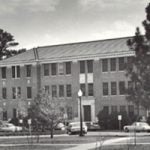 In 1959-60, a 12-stall listening room in Graham Bldg. was replaced by an electronic language laboratory following two years of effort. Funds were finally secured from the NC Legislature through the initiative of Senators Robert Lee Humber and Copeland. Graham Bldg. became the home of the Department of Romance Languages when the Department of Foreign Languages was split in 1966.
In 1959-60, a 12-stall listening room in Graham Bldg. was replaced by an electronic language laboratory following two years of effort. Funds were finally secured from the NC Legislature through the initiative of Senators Robert Lee Humber and Copeland. Graham Bldg. became the home of the Department of Romance Languages when the Department of Foreign Languages was split in 1966.
Brewster Bldg. (1966-1988)
 Brewster Bldg. became the home of the Department of German and Russian when the Department of Foreign Languages was split in 1966. In 1977, the James L. Fleming Seminar Room was dedicated in Brewster Bldg.
Brewster Bldg. became the home of the Department of German and Russian when the Department of Foreign Languages was split in 1966. In 1977, the James L. Fleming Seminar Room was dedicated in Brewster Bldg.
Harold H. Bate Bldg. (formerly General Classroom Bldg., 1988-Present)
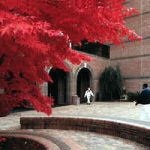 The Department of Foreign Languages moved to the new General Classroom Bldg. when it opened in 1988. The same year Professor Marguerite Austin Perry, who by that time had served ECU for almost fifty years, and Professor James Fleming were honored in a ceremony dedicating a GCB seminar room known as the Fleming-Perry Room.
The Department of Foreign Languages moved to the new General Classroom Bldg. when it opened in 1988. The same year Professor Marguerite Austin Perry, who by that time had served ECU for almost fifty years, and Professor James Fleming were honored in a ceremony dedicating a GCB seminar room known as the Fleming-Perry Room.
A Foreign Language Learning Center was installed with audio-stations linked to a central console, a multimedia classroom and a computer lab. In 2001, now the “Foreign Languages Resource Center”, audio stations were replaced by a second multimedia classroom and tutoring facility, and a virtual lab concept was adopted with online access to digital audio files.
Degrees & Programs
- Original language programs: Foreign languages appeared very early in the curriculum of the East Carolina Teacher Training School founded in 1907. Latin was taught at ECTTS from 1909 to 1917, first by Birdie Mckinney and then by Daisy Waitt. Professor McKinney, recognized as one of the best Latin teachers in North Carolina, had been recruited from the Greenville public schools in 1909.
The original function of foreign language instruction at ECTC was to train Latin teachers for the surrounding counties, since a classical education was the norm before World War I. After the war, interest in Latin waned. There was no foreign language instruction from 1917 to 1923, when R.C. Deal was hired to teach French and Latin. - A BA in French was offered for the first time in 1923 and Latin was again taught as well. Latin was once again dropped in 1936, not to be revived until 1964. A BA in Spanish, however, was added in 1941. French and Spanish were available for those who wanted to teach foreign languages in the high schools. German became part of the curriculum in 1944, only to disappear four years later.
- The department began offering French classes at Camp LeJeune in 1955. Spanish was added in 1957 and Russian the following year. This arrangement lasted until 1990.
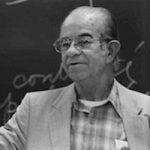 In 1960 elementary German was revived; intermediate German and elementary Russian were offered for the first time. The interest in German and Russian reflected Cold War concerns.
In 1960 elementary German was revived; intermediate German and elementary Russian were offered for the first time. The interest in German and Russian reflected Cold War concerns.- Latin, which had not been taught since 1936, began being taught again in 1964, when Luis Acévez (right) joined the faculty.
- The MA and the MAEd in French and Spanish were offered for the first time in 1970 and continued through the 1980’s.
- In 1983-84, Chinese was taught via video through a special arrangement with North Carolina State University.
- In 1992, under a special arrangement with the Exchange Japan Program, two years of Japanese began to be taught by a specially training graduate student from Japan.
- In the early 1990’s a Classics Program was established and the study of Latin was supplemented with that of Ancient Greek.
- Italian was reintroduced in 1999.
- An interdisciplinary minor in Russian Studies was created in 2005 to promote the study of Russian culture and civilization in its broader context including art, economics, history, and political science
Scholarships & Honoraries
- In 1924 Phi Sigma, a foreign language club, was organized in the department, and in 1938, that club, retaining its original name, became the Phi Sigma Chapter of Sigma Pi Alpha, a National Foreign Language Honor Society.
- A scholarship was established to bring one French speaking native to the campus each year. The first foreign scholarship recipient, Mlle. Jacqueline L. Meziat-Belouse, arrived in 1948 from Oran, Algeria. In 1956 an additional scholar was added. This scholarship for French students continued until 1993. A scholarship to bring a student from Costa Rica was established in 1980 and continued until 1997.
- The Fleming Scholarship was established in 1978 and became the Fleming/Perry Scholarship in 1990. The Fleming/Perry Scholarship is awarded to students majoring in French, German, or Spanish. The amount and number of the scholarships vary from year to year. The department conference room was named after Professors Fleming and Perry in 1989.
- The Freda Jean Smith Scholarship was established in 1996. The Freda Jean Fisher Smith Scholarship is awarded to undergraduates who are enrolled full time in the Department of Foreign Languages and Literatures. The student must be seeking a BS degree in foreign language teaching with a major in Spanish and a concentration in education. The scholarship, which is of variable amount, is awarded annually in amounts not to exceed the cost of in-state tuition and fees.
- Level 1004 Awards: Each year certificates of achievement in foreign language level IV are presented to outstanding students in French German, Greek, Japanese, Latin, Italian, Russian and Spanish.
The Sigma Upsilon chapter of Phi Sigma Iota, the International Foreign Language Honorary, was established at ECU in 1969. - The Eta Mu chapter of Delta Phi Alpha, the International German Honor Society, was established at ECU in 2005.
Major Publications & Sponsored Journals
- Dr. Debra Anderson.
1995. Decolonizing the text: Glissantian Readings in Caribbean and African-American Literatures. Peter Lang.
Dr. Nicole Aronson.
1990. Molière et Madeleine Béjart: le Ballet des Incompatibles. Mercure de France.
1988. Madame de Rambouillet. Fayard. 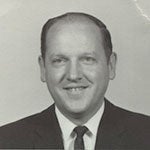 Dr. José Baro
Dr. José Baro
1987. Glosario Completo de los Milagros de Nuestra Senora de Gonzalo de Berceo. Society of Spanish and Spanish-American Studies.- Dr. Steven Cerutti
1999. Cicero. Pro Archia Poeta Oratio: A Stylistic Analysis of the Speech. Bolchazy- Carducci Publishers, Inc.
1998. Cicero: Pro Archia Poeta Oratio. Bolchazy-Carducci Publishers, Inc.
1996. Cicero’s Accretive Style: Rhetorical Strategies in the Exordia of the Judicial Speeches. University Press of America. - Dr. Charles Fantazzi
2004. Angelo Poliziano’s Sylvae. The I Tatti Renaissance Library. Harvard University Press.
2002. Charles Fantazzi and Constant Matheeussen. Juan Luis Vives. De subventione pauperum sive De humanis necessitatibus Critical edition and translation. Selected Works of J. L. Vives IV. Brill Publishers.
2000. Juan Luis Vives, De institutione feminae Christianae. University of Chicago Press.
2000. Ramon Puig de la Bellacasa and Charles Fantazzi. Erasmo de Rotterdam, Adagios del poder y de la querra y teoría del adagio. Pre-Textos (Valencia) - Dr. Stephen V. Dock
1992. Costume and Fashion in the Plays of Jean-Baptiste Poquelin Molière: A Seventeenth-Century Perspective. Editions Slatkine. - Dr. Frédéric Fladenmuller
2001. A novel entitled, Les Oiseaux de Pékin, Éditions les 5 Continents, Québec.
2001. Télescopie: La Science du genre d’ À la recherche du temps perdu. Currents in Comparative Romance Languages and Literatures. Peter Lang Publishing, Inc.
1994. Caractérisation et les modes de la narration de roman moderne. Peter Lang - Dr. Brian Harris
1993. Hugo Ball, Critique of the German Intelligentsia. Translation and annotated edition. Intro. Anson Rabinbach. In European Perspectives: A Series in Social Philosophy and Cultural Criticism, eds. Lawrence D. Kritzman and Richard Wolin. New York: Columbia Univ. Press. - Dr. Birgit Jensen
1998. Auf der morschen Gartenschaukel: Kindheit als Problem bei Theodor Fontane. Amsterdam: Rodopi. - Dr. Dale Knickerbocker
2003: Juan José Millás. The Obsessive-Compulsive Aesthetic. Currents in Comparative Romance Languages and Literatures. Peter Lang Publishing, Inc. - Dr. Nancy Mayberry
1996. La Fundadora de la Santa Concepción. Peter Lang.
1988. Francisco Martinez de la Rosa. G. Hall & Co. - Dr. Maureen Shea
1993. Women as Outsiders: Undercurrents of Oppression in Latin American Women’s Novels. Austin & Winfield. - Dr. Peter Standish
2004: The Culture and Customs of Mexico Greenwood Press.
2001: Understanding Julio Cortázar. University of South Carolina Press.
1999. Línea y Color. Vervuert/Iberoamericana.
1996. Twentieth Century Culture: Hispanic Culture of Mexico, Central America, and the Caribbean. Gale Research, Inc.
1996. Peter Standish and Terry Peavler. Structures of Power: Essays on Twentieth-Century Spanish-American Fiction. SUNY Press.
1995. The Hispanic Culture of South America. Gale Research, Inc.
1992. A Concordance to the Works of Jorge Luis Borges (1899-1986). Edwin Mellen Press. 2786 pages. - Dr. Marcela Ruiz-Funes
2002: On Teaching Foreign Languages: Linking Theory to Practice. Greenwood Publishing Group Inc. - Dr. John Stevens
2002: M. Tulli Ciceronis Somnium Scipionis. Bryn Mawr Latin Commentaries.
EDITORSHIPS OF PROFESSIONAL JOURNALS
- Dr. Judith Hepler Arias
1994-1996. Contagion: Journal of Violence, Mimesis, and Culture. - Dr. Steven M. Cerutti
2000-. Associate Editor, Classical Bulletin - Dr. Stephen V. Dock
1987-1989. Journal of Educational Techniques and Technology. (4): 84. - Prof. Jennifer Valko
2004-05. Co-editor, Brújula. Revista interdisciplinaria sobre estudios latinoamericanos
NOTABLE CONTRIBUTIONS
- Dr. Michael Bassman: establishment and first director of program in Medieval and Renaissance Studies; establishment and first director of program in Ethnic Studies; Director, Honors Program (1998-Present).
- Prof. Manolita Buck: first recipient of the Governor’s Foreign Language Institute for Spanish instructors; FLANC established the Jane Mitchell/Manolita Buck Scholarship for foreign language education majors to honor her for her work with teacher education.
- Dr. Steven Cerutti: first Director of Multidisciplinary Studies (1997-2001)
- Dr. Sylvie Debevec Henning: first Director of International Programs, Thomas Harriot College of Arts and Sciences (2004-present)
- Dr. John Stevens: director of Classics and Great Books (2002-)
AWARDS
- Dr. Nicole Aronson: College Research Award (1994)
- Dr. Michael Bassman: Governor’s Award for Excellence in Teaching (1998)
- Ms. Manolita Buck: Outstanding Major Advisor Award (1993)
- Prof. Carol Christian: University Award for Outstanding Teaching and Board of Governors Distinguished Professor for Teaching Award (2005)
- Dr. Ellen Courtney: College Research Award (2000)
- Dr. Charles Fantazzi: Doctor of Humanities honoris causa, University of Windsor; Fellow of The Royal Flemish Academy of Belgium for Science and the Arts (2002)
- Dr. John Given: College Research Award (2003)
- Dr. Birgit Jensen: College Research Award (2001)
- Dr. Javier Lorenzo: College Research Award (2004)
- Dr. Maria Malby: Research/Creative Activity and Teaching Grant (1988-89)
- Dr. John Stevens: College Research Award (1999); University Award for Outstanding Teaching (2004)
Illustrious Alumni
- Centennial Celebration of Alumni
- Ms. Nellie Lewis, BA French (1972), Director, Ledonia Wright Cultural Center, ECU.
- Ms. Linda E. McMahon , BA French, minor in Spanish, Outstanding Senior Award (1969), President and CEO, World Wrestling Federation.
- Ms. Sylvia Briley, BS French, French teacher J.H. Rose High School
- Ms. Dolly Hathaway, BS Spanish (1969), Spanish teacher D.H. Conley High School
- Ms. Kathleen Brewington, BS Spanish (1994), Principle in Johnston County Schools
- Ms. Bernadette Morris, BA French (1972), Assistant Director of Second Languages, State Department of Public Instruction
- Mr. Steve Davis, BSP Spanish (1996), Director of Migrant Services, Greene County Mental Health Center.
- Mr. Barry Bonikowski, BSP Spanish (1990), Pilot for NetJet.
Advancement Council
The inaugural meeting of the departmental Advancement Council took place on Friday, November 8, 2002. The Advancement Council was established in spring 2002 to bring selected alumni and friends of foreign languages and literatures together so that they could better promote the interests of the department throughout the community. The current members of the Advancement Council are:
- Dr. Robert Albanese, Jr. (Alumnus-French)
- Ms. Marguerite Perry (ECU Emerita-French)
- Ms. Manolita Buck (ECU Emerita-Spanish)
- Ms. Dolly Hathaway (Alumna-Spanish)
- Ms. Pia Leahy (Friend)
- Ms. Robin Potts (Friend)
- Dr. Georgia Hooks Shurr (Alumna-French)
